Joy Neal Kidney's Blog, page 17
July 23, 2024
Waffles with Grandma Leora
When my sister and I were little, several summers during the 1950s, we farm girls spent a week with Grandma Leora Wilson in Guthrie Center. Grandma would have been in her sixties.
Great Grandmother Goff, Leora’s mother, was still living then, maybe visiting her Omaha sons and their families because Gloria and I both remember sleeping in Great Grandmother’s room.
The house at 505 North 4th Street had only two bedrooms. There was also a bed in the open basement, but we children never slept down there.
One year when Mom and Dad came after us, I decided I wanted to stay another week. Oh, I wish Grandma had kept a diary in those days because I don’t remember how she kept me busy. I was crocheting by then, so I bet she helped me make a doily or other project. She had plenty of doilies and antimacassars in the living room.
Grandma never learned to drive so I suppose we walked downtown for her many errands. We probably visited Blanche Fell next door, or Lena Rumelhart, whose name was fun to say, the way it rolled around in my mouth.
I do know that one morning Grandma made me a waffle, all of my own. Mom made waffles at home in a big square waffle iron. They broke into four smaller ones. But Grandma’s waffle baker was round. The delicacy just fit my plate and I got to eat the whole thing. Not only that, but her syrup was in the cutest Log Cabin tin. Even better, I used a small red-handled fork to eat it with. Talk about feeling special!
I still have those little red-handled utensils, two forks and two spoons.
 I sat on this end of that little table at the left. The round plaque above the refrigerator, has fruit on it. On the back: “Happy Birthday, Mom! from Warren, Doris, & Joy,” evidently for Grandma Leora’s 1945 birthday. Yes, I still have that as well.
I sat on this end of that little table at the left. The round plaque above the refrigerator, has fruit on it. On the back: “Happy Birthday, Mom! from Warren, Doris, & Joy,” evidently for Grandma Leora’s 1945 birthday. Yes, I still have that as well. On the back: “Happy Birthday, Mom! from Warren, Doris, & Joy,” evidently for Grandma Leora’s 1945 birthday, since my sister hadn’t been born yet.
On the back: “Happy Birthday, Mom! from Warren, Doris, & Joy,” evidently for Grandma Leora’s 1945 birthday, since my sister hadn’t been born yet.Do you have memories from childhood, one on one, with one of your grandparents?
July 18, 2024
Guest post by patio restorer and author, Craig Matthews
Craig wrote:
 I own a patio restoration business. I started it 3 years back. It allows me to eat all year long.
I own a patio restoration business. I started it 3 years back. It allows me to eat all year long.
In Michigan I can only work on patios like this one (pic) on Lake Huron for about six months a year.
Then, when November comes I focus more on writing.
BUT…
I can easily fall into the trap of imposter syndrome during these months of sweating under the sun.
Or I can use the time to dream, develop characters, build worlds, advance the plots of stories that are under development.
 I’ve written ideas on sandpaper, pieces of lumber, receipts, the inside of my trailer, and the notepad in my truck. I’ve taken pictures of maps I drew in the sand, on boxes, or lumber carved with a nail.
I’ve written ideas on sandpaper, pieces of lumber, receipts, the inside of my trailer, and the notepad in my truck. I’ve taken pictures of maps I drew in the sand, on boxes, or lumber carved with a nail.
Just because you’re not a full time author does not mean that you’re not continually thinking, planning, and plotting new worlds. I may be reminding myself the stories I’ve been entrusted to tell – matter.
How do you overcome the negative aspects of your life in order to write?
#inspiration #amwriting #hope #thespiritualthriller #charitysfire
I “met” Craig on LinkedIn more than a year ago and checked out his Amazon page. I was drawn by both words in his historical novel, Immigrant Patriot. It was such an unbelievable story about his grandparents that I read more of his novels. By the time I got to Cameron Lost, I sensed that Craig is an author to follow. I also sensed God’s fingerprint in his stories.
 Immigrant Patriot was my favorite book of 2023. Charity’s Fire, Craig’s latest, is in the running for favorite this year.
Immigrant Patriot was my favorite book of 2023. Charity’s Fire, Craig’s latest, is in the running for favorite this year.Once he mentioned he is writing a cookbook with his wife. I still have books nudging to get written, so I asked Craig how many he’s got cooking. Fourteen! His newest engrossing page-turner, Charity’s Fire, came out last month. (The Perfect Storm meets The Screwtape Letters in this one!)
The exciting sequel, Book 2 in the “What the Eye Beholds” Series” will be out later this year.
Now you have an inkling of how creativity shows up for novelists while they’re working on something else, or vacationing, or about anytime at all.
The cookbook? Watch for it next year!
July 16, 2024
Quilted Flags Wallhanging
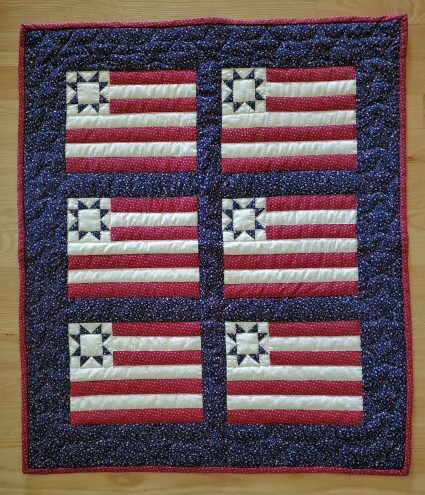 I display this wall hanging every summer, but I’d forgotten about what I’d recorded on the back of it. What a fun discovery this year! “By Joy Neal Kidney – Summer 1994 – Age 50! 50th Anniversary of D-Day.“25th Anniversary of the first men on the moon & of Guy leaving for Vietnam.“Summer that Comet Shoemaker-Levy 9 slammed into Jupiter in 21 chunks.”—–Hand-stitched wall hanging, 26″x30″. Stars quilted in the border. Hmm, collecting history tidbits thirty years ago.
I display this wall hanging every summer, but I’d forgotten about what I’d recorded on the back of it. What a fun discovery this year! “By Joy Neal Kidney – Summer 1994 – Age 50! 50th Anniversary of D-Day.“25th Anniversary of the first men on the moon & of Guy leaving for Vietnam.“Summer that Comet Shoemaker-Levy 9 slammed into Jupiter in 21 chunks.”—–Hand-stitched wall hanging, 26″x30″. Stars quilted in the border. Hmm, collecting history tidbits thirty years ago.
July 12, 2024
Above and Beyond: Radio Silence, a Remarkable WWII Historical Novel
Above and Beyond: Radio Silence by William A. Wright
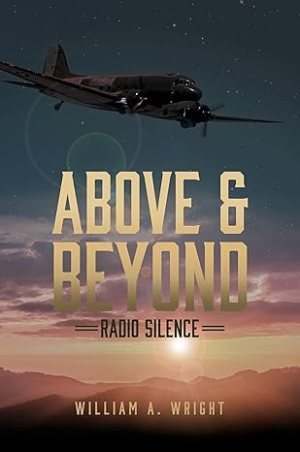 From information about the book on Amazon:
Above and Beyond: Radio Silence is a historical fiction account of an airman’s World War II experience. While much focus is given to Generals and those who rise to glory in fierce battles, this story focuses on a select group of airmen. Those who flew in unarmored, unarmed aircraft behind enemy lines, over battles–to drop troops, supplies, and evacuate wounded. This story is based on my father’s flight records, his notes, and his stories. The events actually happened, but much of the personal detail is based on speculation and interpretation; the backdrop of war is historical.
From information about the book on Amazon:
Above and Beyond: Radio Silence is a historical fiction account of an airman’s World War II experience. While much focus is given to Generals and those who rise to glory in fierce battles, this story focuses on a select group of airmen. Those who flew in unarmored, unarmed aircraft behind enemy lines, over battles–to drop troops, supplies, and evacuate wounded. This story is based on my father’s flight records, his notes, and his stories. The events actually happened, but much of the personal detail is based on speculation and interpretation; the backdrop of war is historical.
Those who served in World War II grew up in the shadow of the great depression, many had nothing but their freedom. Freedom was enough to risk dying for, so they volunteered to go into the unknown to face the terrors of an enemy war machine fiercer than the world had ever known.
Our story revolves around the formation of the 60th Troop Carrier Group and drafting of the Douglas DC-3 into combat. The DC-3 proved very quickly to be a workhorse or flying mule and became designated in the military as a C-53. Orders soon came into Douglas to produce a military modified version, the C-47 and C-47A. These troop transports and crews trained in the British Isles in preparation for the invasion of North Africa, Operation Torch. In North Africa the transport teams took quick training in the use of CG-4A “Waco” gliders. The combination of paratroop drops and gliders would be involved in Operation Husky, the invasion of Sicily.
The story moves on to the night missions into the mountains of Yugoslavia, where supply drops and night landings into torch-lit meadows took place.
This story follows the effects of these events and war in general on average service men and women. Real people serve, real families wait back home, war affects everyone, and it is our mission to document the sacrifices those who serve make. Never forget why we have what we have, why we are a free people.
Our current world was brought about by each individual participant, not just generals and politicians. There is more to history than dates and events, there are emotions, feelings, fear, love, and hate.
My thoughts: Based on the life of his father, William A. Wright has written a masterful and introspective history of WWII during the difficult years of invading Sicily, Italy, and Yugoslavia. Edward G. Wright was awarded to Air Medals and three Oak Leaf Clusters as a radio operator with the 28th Troop Carrier Sq., 60th Troop Carrier Group in the Mediterranean Theater. Some of the most poignant scenes were clandestine missions including rescuing dozens of orphans from the Balkans. A remarkable chapter of WWII history.
Please check out Above and Beyond: Radio Silence on Amazon.
About the Author
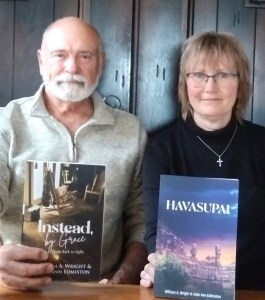 William A. Wright (Bill) and Dale Ann Edmiston (Brave Knight Writers) are a husband-and-wife writing team who live in Pennsylvania.
William A. Wright (Bill) and Dale Ann Edmiston (Brave Knight Writers) are a husband-and-wife writing team who live in Pennsylvania.Bill Wright writes and operates a hobby farm. He has won awards for flash fiction at Saint Davids Christian Writers Conference. Dale Ann edits and is an early childhood educator and laboratory preschool director within a high school. She earned two master’s degrees from Edinboro University. Committed to the writing craft, we attend writing conferences, and have completed master’s level writing courses at Southern New Hampshire University.
The website of Brave Knight Writers.
Here is their Amazon Author page.
July 11, 2024
The Poignant Provenance of My First Year of College
By the time I graduated from high school in 1962, my folks had been making payments on a small farm only a decade. After Dad was discharged from US Army Air Force, he searched a few years for a farm to buy.
But the counselor at Earlham High School determined during my freshman year that I should aim for college. But graduation was coming up and the problem of how to pay for it.
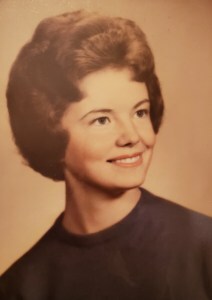 Joy Neal, 1962 Earlham Grad
Joy Neal, 1962 Earlham GradWhen Grandma Leora heard about the dilemma, she decided to cash some bonds, enough to give $1000 to each of her four adult children. The money she gave Mom paid for my freshman year at the State College of Iowa.
I didn’t realize it then but that Grandma had bought those bonds with insurance money she received after the loss of Dale, Danny, and Junior. Those brothers helped me get started in college. I am so humbled by this.
I was the first my immediate family to get to attend college. The summer after my freshman year, I began working at the old college library. My sophomore year was challenging because, even with a small scholarship and the job, I still couldn’t make ends meet. The college’s brand new Donald O. Rod Library found three jobs for me there, and I applied for a National Defense Student Loan. By working in the library each summer, one of them full-time, I graduated in 1966 with a loan to pay off.
But Grandma’s gift was just one of the legacies she blessed with, especially knowing the provenance of this one.
July 9, 2024
Leora Wilson’s Poignant Income, 1947
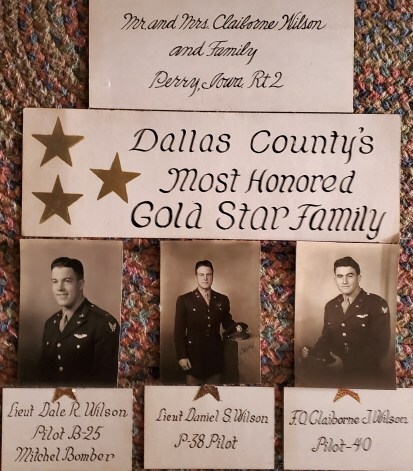
Servicemen were urged to take out insurance policies, which the Wilson brothers did. After the loss of Dale, Danny, and Junior, and after Leora was widowed, she didn’t have another source of income. At the time she lived with her oldest son Delbert and his family on the acreage near Perry.
I don’t know the circumstances for this deposition, but Leora declared her income and expenses as of April 1, 1947.
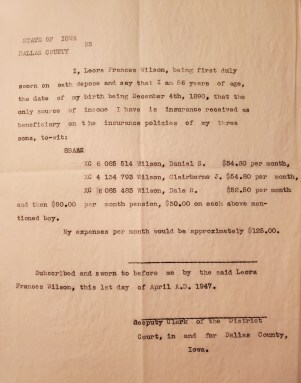
DALLAS COUNTY
I, Leora Frances Wilson, being first duly sworn on oath depose and say that I am 56 years of age, the date of my birth being December 4th, 1890, that the only source of income I have is insurance received as beneficiary on the insurance policies of my three sons, to-wit:
8BAAC
XC 6 085 514 Wilson, Daniel S. $54.80 per month
XC 4 134 793 Wilson, Clairborne [sic] J. $54.80 per month
XC 6 085 483 Wilson, Dale R. $52.50 per month
and then $90.00 per month pension, $30.00 on each above mentioned boy.
My expenses per month would be approximately $125.00.
___________________________
Subscribed and sworn to before me by the said Leora Frances Wilson, this 1st day of April A.D. 1947.
___________________________
Deputy Clerk of the District
Court, in and for Dallas County,
Iowa.
July 5, 2024
Fireworks for July Fifth
Fireworks for us cousins during the 1950s
meant Grandpa Neal’s birthday, which was July 5.
The clan celebrated with cake, homemade ice cream
and fireworks. Treats, served up by our moms,
and singing happy birthday came first.
Then we kids played with sparkler wands
and black snakes that squirmed out of the sidewalk
with an odd smoky smell, leaving black marks.
Our dads launched the real fireworks into a pasture.
One year a spark fell into the box of fireworks
resulting in a memorable finale, with rockets
shooting in all directions. After things calmed down,
Grandpa quipped, “I’ve never seen a bunch of
Presbyterians move so fast.”
-----
Black Snakes fireworks. Thanks to cousin Vince Wells for remembering Grandpa's comment!
Another post about Kenneth Neal.
July 4, 2024
Four Generations
The local papers used to often publish five generation family photos. We didn’t manage five generations on the planet at the same time, but I’m thankful for a few photos with four generations.
 Four generations: Doris Neal, holding baby Joy, Grandma Leora Wilson, Great Grandmother Laura Goff. Rural Minburn, Iowa, July 4, 1944
Four generations: Doris Neal, holding baby Joy, Grandma Leora Wilson, Great Grandmother Laura Goff. Rural Minburn, Iowa, July 4, 1944I was a month old when his was taken July 4, 1944, before Dad flew up from Texas to drive us back with him. Mom and I stayed with her folks, Clabe and Leora, while they still farmed near Minburn, Iowa, although all five sons were off to sever in the war. One of Leora’s brothers had driven their mother, Laura Goff, to Minburn from their home in Omaha. The first four-generation photo of my motherline.
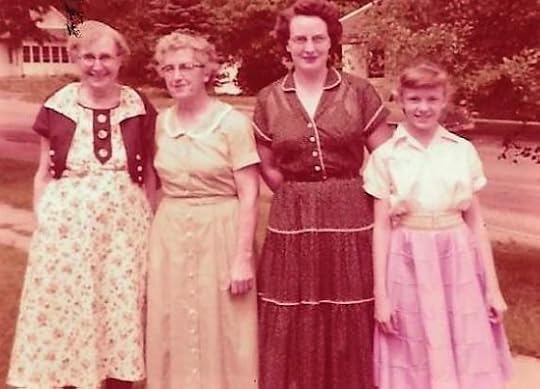 Laura Goff, Leora Wilson, Doris Neal, Joy Neal, Guthrie Center, Iowa, mid-1950s. All four of us are the oldest daughter in her family. Three of us are also firstborns.
Laura Goff, Leora Wilson, Doris Neal, Joy Neal, Guthrie Center, Iowa, mid-1950s. All four of us are the oldest daughter in her family. Three of us are also firstborns.Dad’s Side
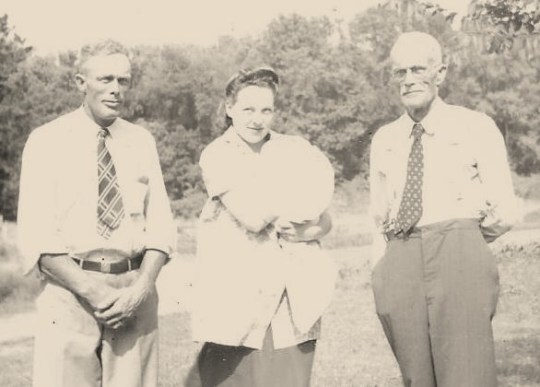 Grandpa Kenneth Neal (who brought a baby locket for me while we were still in the hospital), Mom (Doris Wilson Neal) holding me, Great Grandpa O.S. Neal. (Orlando Swain, named for his mother’s brothers, both of whom served in the Civil War) June 1944
Grandpa Kenneth Neal (who brought a baby locket for me while we were still in the hospital), Mom (Doris Wilson Neal) holding me, Great Grandpa O.S. Neal. (Orlando Swain, named for his mother’s brothers, both of whom served in the Civil War) June 1944Grandpa Kenneth Neal, Doris (standing in for Dad) with baby Joy, Great Grandpa O.S. (Swain) Neal. I was Kenneth the Ruby’s first grandchild. Since it looks like Mom is still wearing a maternity top, this was probably right after we got “home” (Wilson’s Minburn farm) after the hospital.
Dad, Warren Neal, was in Texas training advanced cadets, so this one is an almost-four-generation photo. Swain Neal died shortly after WWII so I never got to know him, except through Mom’s stories. Swain and Nellie Neal were favorite neighbors when the Wilsons lived in the town of Dexter during the Great Depression.
If you’ve read Leora’s Dexter Stories, O.S. Neal is the man who hired Doris to work in the Dexter Canning Factory in 1935. (This is also the lineage that leads to Mayflower ancestors.)
June 29, 2024
Ministering to the Cherokees and to Confederate Soldiers
Dennis Peterson’s Look Unto the Hills: Stories of Growing Up in Rural East Tennessee is such an engaging memoir. He’s also written several scholarly books, including these two that I found especially fascinating. (The notes are from the books’ descriptions on Amazon.)
Evangelism and Expulsion: Missionary Work Among the Cherokees Until Removal
 Christian missionaries prepared the Cherokees for civilization, education, government, and eternity.
Christian missionaries prepared the Cherokees for civilization, education, government, and eternity.
Even before it really was safe for white men to travel in Cherokee territory, Christian missionaries were trying to reach those people for Christ. Evangelism and Expulsion traces the early unsuccessful missionary attempts to reach the Cherokees with the gospel and the later, more successful, efforts of the various major denominations—Moravians, Congregationalists, Presbyterians, Baptists, and Methodists—to evangelize the Cherokee Indians. Peterson describes the work of some of the more prominent, though today little known, missionaries involved and the struggles they faced because of the Cherokees’ native culture, resistance from traditionalists within the tribe, and the U.S. government’s determination to drive the Indians from their lands. Although some results of the missionaries’ efforts—both political and spiritual—are obvious, others are subtler. Only God knows for sure whether the missionaries’ efforts were successful and to what degree. Evangelism and Expulsion also recounts how Sequoyah’s development of the Cherokee syllabary contributed to the spread of the gospel message, increased literacy among the Cherokees (making them one of the most civilized of the Five Civilized Tribes), and enabled the Nation to write its own constitution.
The missionaries’ faithful commitment to obeying the Great Commission among the Cherokees despite numerous hardships continues to bear fruit in the Cherokee Nation today.
Christ in Camp and Combat: Religious Work in the Confederate Armies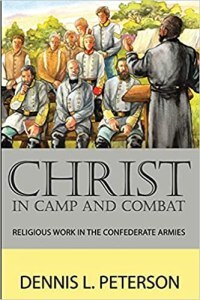 How chaplains, missionaries, and colporteurs prepared Confederate soldier for life here and hereafter.
How chaplains, missionaries, and colporteurs prepared Confederate soldier for life here and hereafter.Religion has too often been relegated to the far periphery of the history of the War Between the States, eclipsed by the emphases on the battles, tactics, and personalities of the conflict. In reality, religion was the very marrow of who Americans were. Religion, specifically traditional and evangelical Christianity, was the very foundation of Southern society during the antebellum period, and that spiritual emphasis permeated society during the war.
When the war came, ministers and Christian laymen alike were burdened for the spiritual welfare of the generation of warriors who answered their country’s call to defend their homelands and who were fated to give their lives for its honor and preservation. A plethora of volunteers from every denomination of Protestant Christianity, as well as from among Roman Catholicism and Judaism, became chaplains, missionaries, and colporteurs. Their mission was to help the soldiers avoid the negative temptations of a life away from the positive influences of home, church, and community and to prepare them for the real possibilities of death and gruesome wounds. They not only encouraged them to prepare for eternity but also to accept the ultimate defeat of the Confederacy as God’s will.
Christ in Camp and Combat is the story of those Christian heroes, spiritual soldiers in a spiritual conflict amidst the raging winds of earthly warfare.
Dennis L. Peterson
 Dennis L. Peterson is an independent author, historian, and editor with numerous published credits in regional and national journals and magazines. A former history teacher and history curriculum writer, his areas of special interest include Southern history, the War Between the States, the Great Depression, and World War II as well as biblical studies.
Dennis L. Peterson is an independent author, historian, and editor with numerous published credits in regional and national journals and magazines. A former history teacher and history curriculum writer, his areas of special interest include Southern history, the War Between the States, the Great Depression, and World War II as well as biblical studies.
He is a member of several historical organizations, including the Society of Independent Southern Historians, the East Tennessee Historical Society, and the Travelers Rest (SC) Historical Society. He is also a docent for the History Museum of Travelers Rest. A native of East Tennessee, he now lives in Taylors, South Carolina. Here is his website.
—–If you like listening to stories, Dennis has recorded several delightful ones which have been produced by Our American Stories with Lee Habeeb.June 27, 2024
Cheerful Four O’Clocks
The autumn of 1944, Danny Wilson had completed his training Santa Rosa, California, qualified as a twin and single engine fighter pilot. He’d been flying the P-38 Lightning, which is brother Dale had called “a man’s dream.” Dan was about to begin processing out and was awaiting overseas orders.
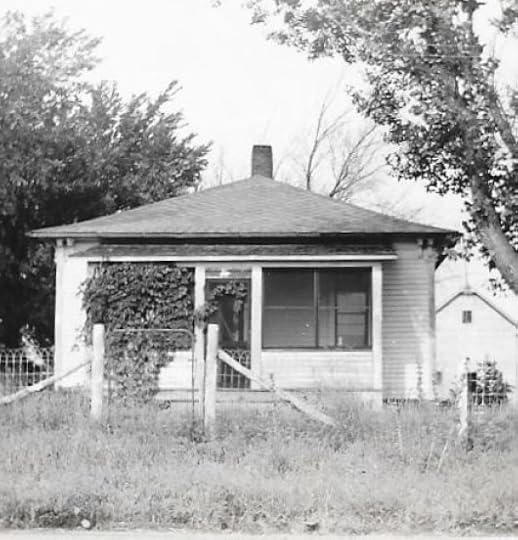 The east end of the house on the Perry acreage, with outbuildings to the west.
The east end of the house on the Perry acreage, with outbuildings to the west.His folks, Clabe and Leora Wilson, had sent a photo of the little house they’d bought on an acreage near Perry, Iowa. “The new place looks like it can be fixed up to look very modern with a white picket fence and all,” Dan wrote. “Just a little paint, a few chickens, a couple of four o’clocks in the front yard, and a rusty pump, cow, and corn patch in the back.”

When I read his letter, I could smell the clean fresh aroma of Four O’Clocks. I haven’t grown any for several years, but they are delightful little bushy plants. Native to Peru and cultivated for hundreds of years, this drought-tolerant plant is named for the time of day its flowers open –give or take a couple of hours. In Iowa they’re annuals, but I collected their round black seeds every autumn to sow the next spring.
I’ve been going through Grandma Leora’s diaries. She mentioned planting Four O’Clocks in one of her flowerbeds around the little house in Guthrie Center. I should start planting these cheerful easy-to-grow flowers again.



